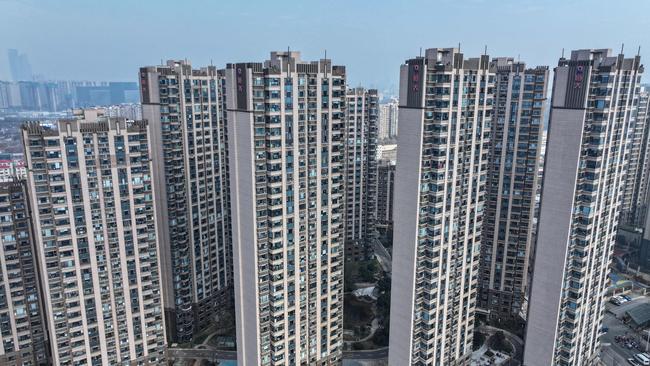Australia closely ‘monitoring’ China property giant Evergrande’s crash
The federal government is watching for signs of wider fallout after the liquidation of Evergrande Group.

The federal government is closely watching for signs of fallout on China’s economy after the Evergrande Group, once the country’s biggest property developer, was ordered to liquidate on Monday.
The liquidation order by Hong Kong’s High Court is a milestone in the “sharp deterioration” of China’s property sector, which the Reserve Bank in October flagged as one of its top concerns for the outlook of the Australian economy.
Jim Chalmers said on Monday night that China’s property sector decline was “one of the reasons why the global economic outlook is uncertain”.
“The slowdown in China and challenges in the property sector there are key risks to the global economy. We’re monitoring these developments closely,” the Treasurer said.
China is by far Australia’s biggest export market, with trade dominated by iron ore. Australia’s big miners, all hugely exposed to China, are also Canberra’s biggest taxpayers.
Australia’s biggest miner BHP closed down 1.4 per cent on Monday, while Rio Tinto fell 0.6 per cent. Iron ore miner Fortescue closed up 1 per cent, suggesting many investors were far from alarmed with the news that has been years in the making.
Economists cautioned that the Chinese economy was a long way from systemic financial crisis.
“China is an $18 trillion economic giant – it’s just growing more slowly now. But it’s still by far the world’s second largest economy and it continues to dominate the region economically,” said ANZ chief economist Richard Yetsenga.
He said the collapse of Evergrande was “symptomatic” of China’s adjustment from a rapidly growing economy with housing construction a key driver of growth to an economy to a slower growing one where other sectors are more prominent.
“In my view there’s no comparison with the US’s Lehmann moment in 2008,” he said, referring to the banking collapse that triggered the global financial crisis.
Evergrande first defaulted on its debt in late 2021, triggering years of gloom in China’s property sector which has accounted for around 25 per cent of the country’s economic activity.
More than 50 Chinese property developers have since defaulted on their debts, leading to widespread job cuts across the industry and the longest period of price decline on record. Real estate accounts for nearly 70 per cent of China’s household wealth.
Beijing has been reluctant to step in with a big stimulus package, as it tries to de-risk its bloated property sector, rein in the debt of Chinese provincial governments and move the nation’s economy towards manufacturing sectors.
David Olsson, president of the Australia China Business Council, said Evergrande’s liquidation was part of China’s “ongoing structural reform process”, which Australian businesses have been adjusting to for years.
A Hong Kong-based partner at the China-focused law firm King & Wood Mallesons, Mr Olsson said Beijing still had “a lot of policymaking levers it can pull” if the property sector’s decline were to worsen.
In its latest financial stability review in October, the RBA warned that problems stemming from the “sharp deterioration” in China’s property sector could lead to a global economic slowdown, as well as lower prices and demand for the goods and services that Australia exports to China.
Despite the glum property outlook, China’s leaders are expected to set an economic growth target of about 5 per cent for 2024. Last year, China’s economy grew 5.2 per cent, according to official statistics.
While that was one of the lowest levels since 1990 for the country, the IMF said China was still the largest driver of world economic growth in 2023.





To join the conversation, please log in. Don't have an account? Register
Join the conversation, you are commenting as Logout